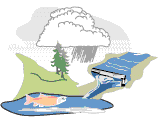OTHER INFO
Climate Links
Climate
Impacts Group
CIG
Seminars
Climate Impacts on the Pacific Northwest
Winter Quarter 2002
SMA 550C / ENVIR 500B / ATMS 591B / GPHYS 580B
SYLLABUS
|
Dr. Nathan Mantua |
Dr. Amy Snover |
|
616-5347 |
221-2997 |
Course Meeting Times: Wednesdays, 8:30-9:20, OTB 211; Fridays, 9:30-11:20, OTB 211
Office Hours: By appointment
Introduction: In this course, we will examine current and future (resulting from global warming) patterns of Pacific Northwest climate and will determine how knowledge of these patterns could be used to improve regional natural resource management. This evaluation will be based on an understanding (which will be developed in this course) of: (1) the importance of climate fluctuations for the region's water, fish, forest, and coastal resources; (2) past societal reactions to climate events and their regional impacts and to climate forecasts; (3) how climate and public policies interact to impact natural resources, industry, and human institutions in the PNW; (4) the predictability (and associated uncertainty) of future climate variations and human caused climate changes. Students in this course will work across traditional disciplinary boundaries in order to tackle current real-world environmental policy issues.
Core questions:
- What is the sensitivity of PNW natural resources to climate variability and change?
- What is the adaptability of PNW natural resources to climate variability
and change?
- What are the current challenges facing natural resource management?
- Where might climate information improve natural resource management and planning?
- What are the barriers to using climate information in management and planning and how might they be overcome? Consider barriers stemming from policies, scientific understanding of underlying processes, and/or inherent properties of the system.
- What is the vulnerability of PNW natural resources to climate variability and change?
Readings: The course readings consist of the Climate Impacts Group's (CIG's) draft book manuscript, Rhythms of Change: Climate impacts on the Pacific Northwest (currently under review) and selected articles. A reading packet is available from RAMS copy center on the Ave (4144 University Way, 632-6630). A copy of the reader will be on reserve in the Natural Sciences (Allen) Library. Many of the readings are also available on the web (see the reading list and web page).
Assignments & Expectations:
Preparation & participation: Students are expected to be active, thoughtful and prepared participants in discussion every day of class. The assigned readings are to be completed prior to each class meeting.
Leading discussion: Each student will lead Wednesday class discussion once. This will involve being prepared to develop a conceptual model of the topic at hand in class using the Kaje method (which we'll learn in weeks 1 & 2), leading discussion on the core questions and distributing the completed conceptual model to the class at the next meeting time.
Essays: Seven short (1-2 pg) essays based on the assigned readings will be due at the beginning of class in weeks 2-8. We would like you to go beyond the readings in your writing (but to use them as your foundation); to present a clear, focused, well-developed and substantiated argument; to write clearly and carefully; and to get the facts right. Length = two pages maximum! Essays will be graded on a scale of 1-10, with a grade of 8 assigned to a good essay, 9 to a very good, and 10 to an exceptionable essay. Your lowest score will be dropped in computing your grade.
White paper: Each student is charged with writing a 10-15 page policy-oriented "white paper" on the application of climate information to the resource issue of their choice. Brief (½ page) proposals for white paper topics are due in class on January 30. During weeks 9-10, each student will orally present his/her white paper to the class. The final white paper is due on the date of the scheduled course final exam (March 20).
There are no exams.
Grading:
Participation
15%
Leading discussion
10%
Essays (with lowest score dropped)
25%
White paper (including presentation)
50%
We will grade each of you on the quality of your work; we will not grade on a curve. Late assignments (without prior approval) will have a 10% penalty subtracted for each day late unless otherwise negotiated with instructors on a case-by-case basis.
